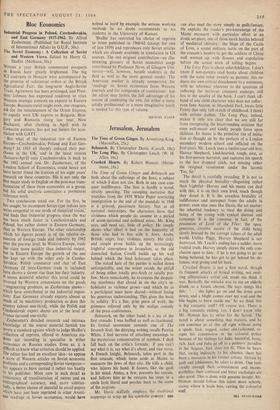Bloc Economics
Industrial Progress in Poland, Czechoslovakia, and East Germany 1937-1962. By Alfred Zauberman. (Published for Royal Institute of International Affairs by O.U.P., 50s.) The Soviet Economy : A Collection of Soviet and Western Views. Edited by Harry G. Shaffer. (Methuen, 50s.) WITHIN a year British commercial prospects in Russia have greatly brightened. The big ICI contracts in Moscow were accompanied by the promise of substantial orders at the British Agricultural Fair; the long-term Anglo-Soviet Trade Agreement has been prolonged, and Presi- dent Johnson has expressed readiness to relax Western strategic controls on exports to Eastern Europe. Business travel might even, one imagines, ask for the reinstatement of the Orient Express, so rapidly were UK exports to Bulgaria, Hun- gary and Runiania rising last year.. Now Bucharest, after clashing in April with its Comecon partners, has put out feelers for asso- ciation with GATT.
But what of the industrial trio of Eastern Europe—Czechoslovakia, Poland and East Ger- many? In 1963 all sharply reduced their pur- chases in the UK, and in the latest returns (January-April) only Czechoslovakia is back to. the 1962 annual rate.. Dr. Zauberman, of 'the London School of Economics, could hence not have better timed the fruition of his eight years' research on these countries. His, is not only:-the first major study in English on the post-war trans- formation of these three economies as a group, but his solid analysis constitutes a permanent reference work.
Two conclusions stand opt. For the first, he has sought 'to recompute Soviet-type indices into series congenial to our mode of statistical vision,' and finds that industrial progress since the war has been much faster in Czechoslovakia and Poland, but rather sloWer in Eastern Germany, than in Western Europe. The other relationship Which his figures permit is of the relative ex- pansion of foreign trade and industry by 1962 Over the pre-War level. In Weitern Europe, trade has risen more quickly than industrial output, but in Eastern Europe the growth of the one has kept up with the other only in Czecho- slovakia; Polish commerce and that of East Germany (if intra-German trade is included) have shown a slower rise than has their industry. It seems doubtful whether this trend could be reversed by Western concessions on the goods
-engineering products, as Zaubermin shows— Which have contributed to the industrial expan- sion: East Germany already exports almost as attach of its machinery production as does this country (about one-third), while the Polish and Czechoslovak export shares are at the level of Prance (around one-sixth).
Zaubernian's detailed research and intimate knowledge of the source material furnish too severe a standard against which to judge Shaffer's collection of reprints, offered to American stu- dents not intending to specialise in either economics or Russian studies. Even so, it is difficult to know what criterion should be applied. The editor has had an excellent idea—to appose a score of Western articles on Soviet economic Problems and a corresponding Soviet viewpoint— but appears to have carried it rather too hastily to his publisher. More care in such detail as Consistency of transliteration of names and on bibliographical accuracy, and, more substan- tially, a better choice of material to avoid papers Which have just been reprinted in other Ameri- can readings in Soviet economics, would have
helped to instil by example the serious working methods he no doubt recommends to his students in the University of Kansas.
Shaffer has restricted his choice of reprints to items published in 1960-62 (except for two of late 1959) and reproduces only Soviet articles which are already available in translation in US sources. The one original contribution—an illu- minating glossary of Soviet economics usage contributed by Professor Nove, of Glasgow Uni- versity—will, however, benefit students in the .field as well as the more general reader. The American market is already competitive for 'readings' on Soviet economics from Western journals and for compendia of translations: but the editor may forfeit the full advantage of his notion of combining the two, for either a more solidly professional or a more imaginative touch is needed for this type of volume.
MICHAEL K'ASER


































 Previous page
Previous page